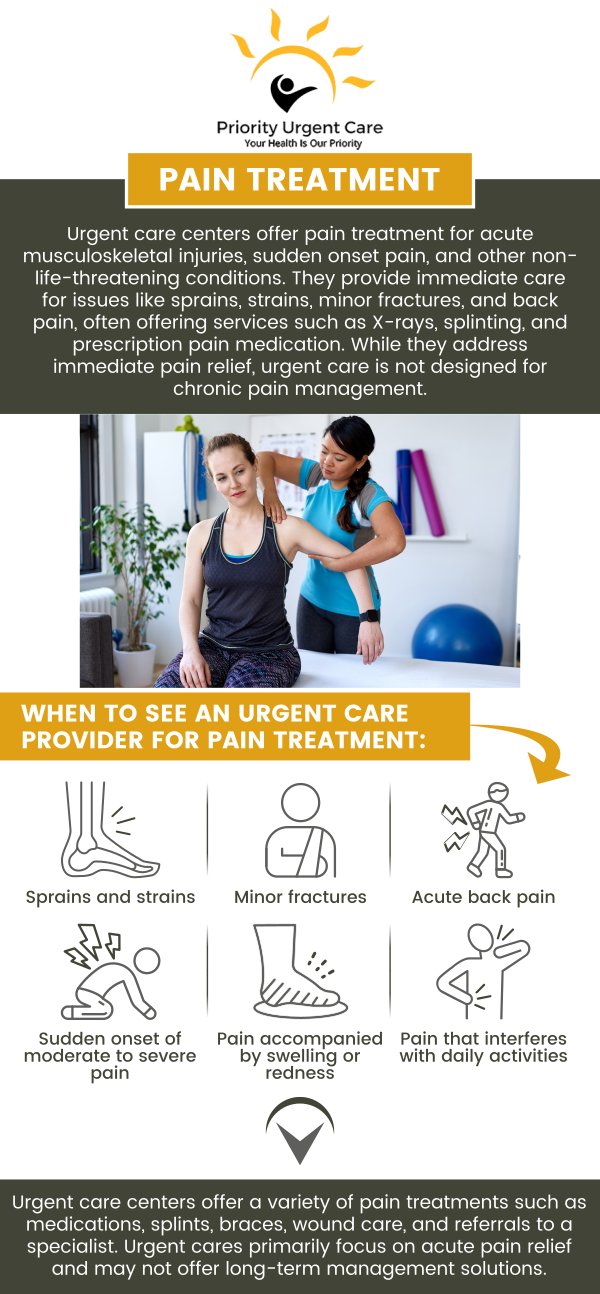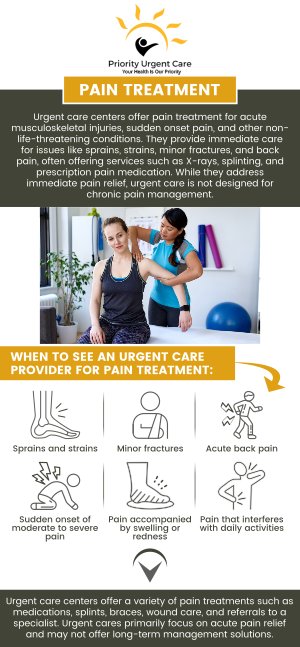Urgent Care for Pain Treatment Q&A
At Priority Urgent Care and Walk-In Clinic, we understand that pain can disrupt your daily life and well-being. Our dedicated team is equipped to provide prompt and effective treatment for various types of pain, from acute injuries to chronic conditions. Whether you’re dealing with back pain, joint discomfort, or muscle strains, we offer comprehensive evaluations and tailored treatment plans to help you find relief and get back to your normal routine. Trust Priority Urgent Care for compassionate care and fast relief when you need it most. For more information, contact us today. You can also book an appointment online or simply walk-in. We have convenient locations to serve you in Cromwell CT, East Haven CT, Ellington CT, Newington, CT, Oxford, CT, Unionville CT and Wallingford, CT.




Table of Contents:
When should I visit urgent care for pain?
What types of pain can be treated at urgent care?
How long will I have to wait at urgent care for pain treatment?
How much does it cost to visit urgent care for pain?
Pain is often the primary reason many individuals seek immediate medical attention. Knowing when to visit urgent care for pain can help you avoid unnecessary trips and ensure you receive the right care at the right time.
If you experience severe, sudden, or unexplained pain, seek immediate medical attention, as it could indicate serious conditions like fractures, dislocations, kidney stones, or appendicitis. Pain related to an injury, especially if severe or persistent, should also be evaluated promptly. Injuries from falls, twists, blunt force, or any incident that impedes normal movement or is accompanied by visible changes like swelling or deformity should be assessed at urgent care. We are equipped to conduct necessary tests, such as X-rays, to diagnose fractures or other serious injuries.
Persistent pain that doesn’t improve with home remedies or over-the-counter medication may signal serious ailments like gallstones, ulcers, or heart disease. Severe, sudden headaches, especially those known as “thunderclap headaches,” or headaches with neurological symptoms should be evaluated urgently.
If your pain is accompanied by other severe symptoms such as high fever, difficulty breathing, sudden weight changes, changes in vision or hearing, nausea, vomiting, or diarrhea, it’s important to seek medical help. These symptoms could signify serious conditions like heart disease, lung disease, or neurological problems.
One of the most common reasons patients visit urgent care is to manage acute musculoskeletal pain. This can arise unexpectedly from sprains, strains, fractures, or dislocations. Healthcare professionals can provide immediate relief and necessary intervention to stabilize the condition.
Urgent care can treat chronic pain conditions such as headaches, migraines, sinus headaches, and persistent back pain. Often, these pains are caused by muscle strains, ligament sprains, or disc herniations.
Abdominal pain, which can range from mild to moderate, is another condition that urgent care is equipped to handle. Whether it’s due to indigestion, constipation, diarrhea, minor infections, gastritis, kidney stones, or appendicitis, doctors can conduct necessary tests and examinations to identify the cause and provide suitable treatment.
They can also manage non-cardiac chest pain, urinary tract pain associated with infections, and skin pain from minor cuts, abrasions, burns, or insect bites. Some services include wound cleaning and dressing to prevent infection and provision of pain relief medications where necessary.
While urgent care can’t replace a visit to a specialist, they can provide interim care for these issues until a specialist appointment can be arranged. They are capable of treating a wide variety of pain types, offering immediate relief and ensuring the condition doesn’t worsen.
It is important to note that it is not a substitute for emergency care. Severe or life-threatening pain should be treated in an emergency room.
It’s important to understand that wait times can vary based on several factors. Wait times at our center can be influenced by:
• Severity of Pain: For life-threatening pain, immediate attention is often ensured. For less severe cases, you may experience a slightly longer wait as critical cases are prioritized.
• Patient Volume: The number of patients at the time of your visit can impact wait times. During busy periods like flu season or following a local accident, longer waits may occur.
• Time of Day and Day of Week: Weekends, evenings, and holidays typically see higher patient volumes, leading to longer wait times. Off-peak hours, such as early mornings or late evenings, usually have shorter wait times.
• Staffing: The availability and efficiency of medical staff can influence wait times.
According to the Urgent Care Association, the average wait time at an urgent care facility is typically under 30 minutes. To minimize waiting time, consider visiting during off-peak hours. You may also call ahead to get an estimate of the current wait time or check it online. If available, scheduling an appointment can help. If the wait time is too long, seeking care at an emergency department where pain relief can be administered more promptly is advisable.
Remember, if your pain is severe or accompanied by other serious symptoms, don’t seek immediate medical attention.
Several elements can affect the overall cost of a visit:
• Location: Being based in an urban area can influence the overall cost of your visit.
• Type and Severity of Pain: The severity and underlying cause of your pain can impact the required treatments and level of care, affecting your cost.
• Diagnostic Tests: Additional tests such as X-rays, blood work, or MRI scans may be necessary to pinpoint the source of your pain, adding to the overall cost.
• Medications: Prescribed pain relief medications, such as opioids, NSAIDs, or anticonvulsants, can also increase the cost.
• Follow-Up Appointments: Follow-up care may be needed to monitor progress and adjust treatment plans, contributing to the overall cost.
• Insurance Coverage: Most insurance plans cover urgent care visits, but the coverage amount can vary, with some plans requiring a co-pay or deductible.
The cost of a visit for pain management can vary widely. On average, it ranges from $50 to $150 for those without insurance, but it can be as much as $200 or more depending on your condition’s specifics. This estimate does not include the cost of additional tests, medications, or follow-up appointments.
You can pay using a variety of methods, such as cash, credit cards, insurance, and health savings accounts (HSAs). Be sure to verify with us the accepted payment options and any co-pays or deductibles that might apply.
While urgent care is a cost-effective alternative to the emergency room, it shouldn’t replace regular visits to your primary care physician, especially for chronic pain. Regular check-ups can catch issues early, potentially reducing the need for urgent care. Always prioritize your health and seek proper medical attention for persistent or severe pain. We serve patients from Ellington CT, Unionville CT, East Haven CT, Cromwell CT, Oxford CT, Newington CT, Wallingford, CT, East Windsor CT, Somers CT, Burlington CT, Canton CT, Branford CT, New Haven CT, Middletown CT, Rocky Hill CT Seymour CT, Middlebury CT, Hartford CT, Addison CT, and BEYOND!

Additional Services You May Need
▸ Urgent Care
▸ DOT Physicals
▸ Worker’s Injury Treatment
▸ Drug Testing
▸ Physical Exams
▸ School/Sports Physicals
▸ Sports Injury Treatment
▸ X-Ray Services
▸ Pediatric Urgent Care
▸ Poison Ivy
▸ STD Testing
▸ Immunizations & Vaccinations
▸ Lab Testing
▸ Pre-Employment Physical
▸ Employer Services


